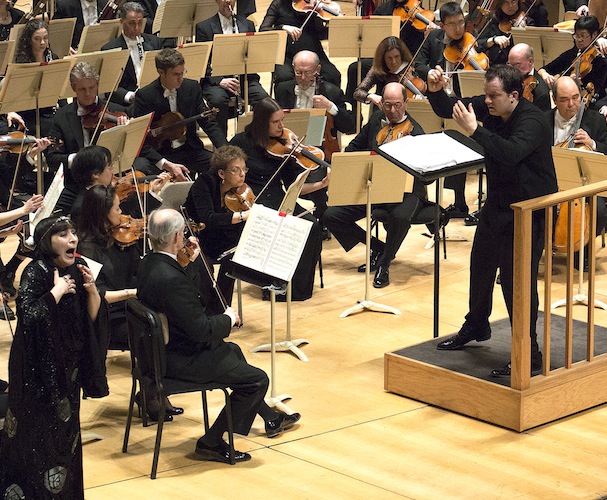Classical Concert Review: Andris Nelsons and the Boston Symphony Orchestra Perform a Scorching “Salome”
If “Salome” was a harbinger for what’s to come, we may be on the cusp of a golden era, indeed.

BSO Music Director Designate Andris Nelsons leads the orchestra in “Salome” with Soprano Gun-Brit Barkmin. Photo: Stu Rosner.
By Jonathan Blumhofer
The Andris Nelsons era unofficially got underway in grand style at Symphony Hall on Thursday night, a day after the music director designate announced the 2014-15 Boston Symphony Orchestra (BSO) season, his first at the helm. Nelsons, who’s one of those rare birds these days whose conducting career actually began in the opera house, led a scorching performance of Richard Strauss’s one-act shocker, Salome, conducting the same cast – save one – that performed this work with him and the Vienna Philharmonic last week at Carnegie Hall.
Since its premiere in Dresden in 1905, Salome has courted admiration and controversy in almost equal measure. Adapted from Oscar Wilde’s 1893 play of the same name, the tale of incest, lust, and obsession which famously ends with the title character kissing the severed head of John the Baptist (Jochanaan) may not quite scandalize 21st-century audiences the same way it did fin-de-siècle ones. Still, as Thursday’s performance demonstrated, the story hasn’t lost its power to jar and unsettle: if anything, it’s as resonant with our time and culture as it has been with any.
As Salome, Gun-Brit Barkman gamely achieved the delicate balance between experienced seductress and catty, teenaged temptress that the role demands. Her cool, powerful voice had little difficulty cutting through the big orchestra and her command of the stage was such that you couldn’t take your eyes off of her: this Salome was both supremely confident and mysterious – you never quite knew what she might do next. Even so, Barkman managed to make Salome into something approaching a sympathetic character: delusional and consumed, perhaps, but troublingly human all the same.
Tenor Gerhard Siegel brought both agility and color to his account of Herod’s part. There’s not much to admire in Herod – he’s manically insecure, wildly superstitious, and infatuated with his stepdaughter, among other things – but in Siegel’s hands (and voice) this conflicted and tormented soul emerged as a fascinating study in human fallibility.
As Herod’s wife, the magnificent Jane Henschel made a powerful Herodias. Though this character has only a supporting role, it’s clear that she exerts tremendous influence over both Herod and Salome. Herodias’s bickering with Herod not only injected a welcome levity to the proceedings, but also emphasized her commanding presence in the narrative, a trait fully realized, musically, in her transformation after Salome demands the head of Jochanaan as the prize for her dance. Henschel’s enactment of this moment was a thing to behold: subtle and callous, not once realizing it will cost Salome her life.
Strauss’s loathing of Christianity was no secret and in Jochanaan one encounters a character for which the composer had little sympathy. Jochanaan’s music – compared to Salome’s, Herod’s, and Herodias’s – is banal and chaste, yet on Thursday one came away most impressed by this character’s nobility and humility, thanks to Evgeny Nikitin’s penetrating, stentorian account of his role.
Among several other soloists, Carlos Osuna’s sweet, ill-fated Narraboth didn’t always overcome the orchestra, but he channeled his character’s obsession for Salome with winning intensity. Renée Tatum’s Page brought brief shades of reason that stood in stark contrast to nearly everything else unfolding on stage.
Through the whole evening, the BSO delivered a blazing account of Strauss’s orchestral writing. Winds, brass, and percussion led the way, but there were no weak links in this ensemble. Indeed, the orchestra held nothing back. Their sense of purpose was most audible in the extended orchestral passages (especially the transition between the Salome and Jochanaan’s scene and the introduction of Herod and Herodias, and the famous “Dance of the Seven Veils”), which featured playing that combined lucidity with an almost overpowering physical presence.
Salome is not only a ferociously difficult piece to play, but also devilishly hard to balance with the singers, a fact that’s only exaggerated in concert performances where the orchestra isn’t in a pit. For the most part, Nelsons managed an impressive degree of instrumental clarity that ensured nearly all the vocalists could be heard. A few moments – the dialogue between the two soldiers at the beginning of the opera, for instance – were unintelligible save for the supertitles, but nearly everything else came across well.
Nelsons officially takes up his post with an opening night gala on September 27th. More opera (in the form of excerpts) is on the bill then, but for all intents and purposes Thursday’s performance was his accession to the throne – September’s concert is only the formal coronation ceremony. If Salome was a harbinger for what’s to come, we may be on the cusp of a golden era, indeed.
Jonathan Blumhofer is a composer and violist who has been active in the greater Boston area since 2004. His music has received numerous awards and been performed by various ensembles, including the American Composers Orchestra, Kiev Philharmonic, Camerata Chicago, Xanthos Ensemble, and Juventas New Music Group. Since receiving his doctorate from Boston University in 2010, Jon has taught at Clark University, Worcester Polytechnic Institute, and online for the University of Phoenix, in addition to writing music criticism for the Worcester Telegram & Gazette.
Tagged: Andris Nelsons, Boston Symphony Orchestra
